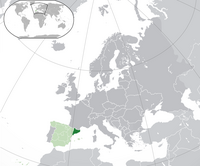
Photo from wikipedia
ABSTRACT Agents’ perceptions on the state of the economy can be affected during economic crises. Tendency surveys are the main source of agents’ expectations. The main objective of this study… Click to show full abstract
ABSTRACT Agents’ perceptions on the state of the economy can be affected during economic crises. Tendency surveys are the main source of agents’ expectations. The main objective of this study is to assess the impact of the 2008 financial crisis on agents’ expectations. With this aim, we evaluate the capacity of survey-based expectations to anticipate economic growth in the United States, Japan, Germany and the United Kingdom. We propose a symbolic regression (SR) via genetic programming approach to derive mathematical functional forms that link survey-based expectations to GDP growth. By combining the main SR-generated indicators, we generate estimates of the evolution of GDP. Finally, we analyse the effect of the crisis on the formation of expectations, and we find an improvement in the capacity of agents’ expectations to anticipate economic growth after the crisis in all countries except Germany.
Journal Title: Applied Economics Letters
Year Published: 2017
Link to full text (if available)
Share on Social Media: Sign Up to like & get
recommendations!